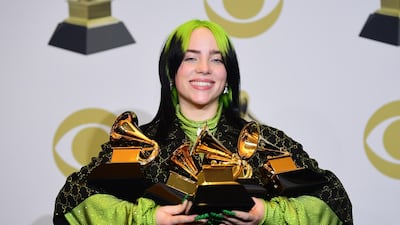Once again, this year’s Grammy Awards leave us with more questions than answers.
The January 27 ceremony was shaping up to be one of the more interesting of recent years, with an engrossing list of nominees reflecting the exciting new terrain pop music traversed in recent years.
As it turned out, that competition was only in name.
US singer Billie Eilish made a clean sweep of the awards by winning five categories, including the big four: Record of the Year, Album of the Year, Song of the Year and Best New Artist.
While there is no doubt the 18-year-old had a brilliant 12 months, her domination of the ceremony simply doesn’t reflect the dynamism coursing through pop music today.
Other nominees this year did a stellar job in taking their respective genres in new and interesting directions. Lizzo has carved out her own place in pop music with her inspirational brand of soul and RnB. Torch singer Lana Del Ray's bruising balladry continues to confound genre expectations, while Lil Nas X has managed to merge the seemingly irreconcilable worlds of country music and hip-hop.
To simply discount their efforts and focus on Eilish’s achievement alone smelt of convenience. It was triumph of popularity over risk, thus rendering this year's ceremony as a dud, once again.
I take no pleasure in stating this because I actually do love the Grammy Awards.
In a sea of brand promotion campaigns disguised as awards, the Grammys is the rare music institution that aims to reward artists based on creative merits. Running since 1959, it commands a brand of authenticity and history unparalleled in the music industry. However, those qualities are being gradually eroded through a series of missteps that is at risk of rendering the awards irrelevant.
It seems that with each year, the music ceremony manages to escape a potential crisis only to create a new one.
Last year the awards proved it was socially on point by giving Childish Gambino the Record of the Year for This is America, only for it to be overshadowed by the rest of the awards' general mistreatment of hip-hop artists across all categories that particular year.
That ruckus came on the back of a series of missteps throughout the last decade, which includes a flawed list of nominations and winners that reflect a whole bunch of issues ranging from conservatism to sexism. While the Grammys committee has acknowledged some of these problems by expanding its membership base (they decide who wins each award) to include fresh blood, in addition to creating new selection panels to ensure a more representative list of nominees, it often feels like they are a few beats behind.
The Grammys is now facing its biggest challenge yet, and that’s coming to terms with how modern technology has so thoroughly disrupted all aspects of the music industry. From the way songs are consumed to the way they are composed and produced, technology went on to not only create new music genres, but to increasingly render existing and established forms as irrelevant.
The Grammy Awards has failed to acknowledge that trend. While efforts were made to engage in current trends by acknowledging music streaming as a source of an artist’s popularity (as opposed to pure sales), it has yet to evolve its award structure to accommodate the changes happening on the ground today.
One of which is how genre has increasingly become an irrelevant definer of an artist’s work. Technology, both in the new kinds of music that can be created to the online playlists in which most people consume songs, created an exciting new landscape where artists have gleefully disregarded musical conventions.
It is time now for the Grammy Awards to take on the artists’ lead and shake up its increasingly tired nomination categories. This means jettisoning increasingly nonsensical gongs such as the Best Traditional Pop Vocal Album and Best Urban Contemporary Album in favour of new descriptions more in keeping with today’s scene.
This also means a deeper interrogation of all nominees work and thus, extending the two-month long period in which Grammy members cast their votes for all nominations. Such changes could mean the Grammy Awards provides a more accurate snapshot of what is happening in the music industry today.
With pop music evolving at a rapid pace, the Grammys need to stay in tune, or risk being left behind.


